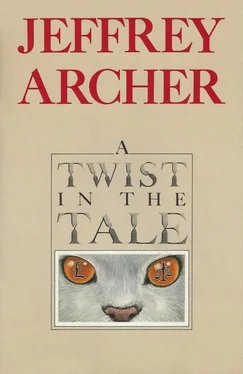It took the Colonel only a few days to discover why.
He decided his first task was to try to raise the battered morale of his troops. As there was no padre among those officers who had been captured he began each day by conducting a short service of prayer. Once the service was over the men would start work on the railway that ran alongside the camp. Each arduous day consisted of laying tracks to help Japanese soldiers get to the front more quickly so they could in turn kill and capture more Allied troops. Any prisoner suspected of undermining this work was found guilty of sabotage and put to death without trial. Lieutenant Takasaki considered taking an unscheduled five-minute break to be sabotage.
At lunch prisoners were allowed twenty minutes off to share a bowl of rice — usually with maggots — and, if they were lucky, a mug of water. Although the men returned to the camp each night exhausted, the Colonel still set about organizing squads to be responsible for the cleanliness of their huts and the state of the latrines.
After only a few months, the Colonel was able to organize a football match between the British and the Americans, and following its success even set up a camp league. But he was even more delighted when the men turned up for karate lessons under Sergeant Hawke, a thick-set Australian, who had a Black Belt and for good measure played the mouth organ. The tiny instrument had survived the march through the jungle but everyone assumed it had to be discovered before long.
Each day Moore renewed his determination not to allow the Japanese to believe for one moment that the Allies were beaten — despite the fact that while he was at Tonchan he lost another twenty pounds in weight, and at least one man under his command every day.
To the Colonel’s surprise the camp commandant, despite the Japanese national belief that any soldier who allowed himself to be captured ought to be treated as a deserter, did not place too many unnecessary obstacles in his path.
‘You are like the “British Bullfrog,”’ Major Sakata suggested one evening as he watched the Colonel carving cricket bails out of bamboo. It was one of the rare occasions when the Colonel managed a smile.
His real problems continued to come from Lieutenant Takasaki and his henchmen, who considered captured Allied prisoners fit only to be considered as traitors. Takasaki was, however, careful how he treated the Colonel personally, but felt no such reservations when dealing with the other ranks, with the result that Allied soldiers often ended up with their meager rations confiscated, a rifle butt in the stomach or even left bound to a tree for days on end.
Whenever the Colonel made an official complaint to the commandant, Major Sakata listened sympathetically and even made an effort to weed out the main offenders. Moore’s happiest moment at Tonchan was to witness the Undertaker and the Pig boarding the train for the front line. No one attempted to sabotage that journey. The commandant replaced them with Sergeant Akida and Corporal Sushi, known by the prisoners almost affectionately as ‘Sweet and Sour Pork.’ However, the Japanese High Command sent a new Number Two to the camp, a Lieutenant Osawa, who quickly became known as ‘The Devil’ since he perpetrated atrocities that made the Undertaker and the Pig look like church fête organizers.
As the months passed, the Colonel and the commandant’s mutual respect grew. Sakata even confided to his English prisoner that he had requested that he be sent to the front line and join the real war. ‘And if,’ the Major added, ‘the High Command grants my request, there will be only two NCOs I would want to accompany me.’
Colonel Moore knew the Major had Sweet and Sour Pork in mind, and was fearful what might become of his men if the only three Japanese he could work with were posted back to active duties to leave Lieutenant Osawa in command of the camp.
Colonel Moore realized that something quite extraordinary must have taken place for Major Sakata to come to his hut, because he had never done so before. The Colonel put his bowl of rice back down on the table and asked the three Allied officers who were sharing breakfast with him to wait outside.
The Major stood to attention and saluted.
The Colonel pushed himself to his full six feet, returned the salute and stared down into Sakata’s eyes.
‘The war is over,’ said the Japanese officer. For a brief moment Moore feared the worst. ‘Japan has surrendered unconditionally. You, sir,’ Sakata said quietly, ‘are now in command of the camp.’
The Colonel immediately ordered all Japanese officers to be placed under arrest in the commandant’s quarters. While his orders were being carried out he personally went in search of The Devil. Moore marched across the parade ground and headed toward the officers’ quarters. He located the second-in-command’s hut, walked up the steps and threw open Osawa’s door. The sight that met the new commandant’s eyes was one he would never forget. The Colonel had read of ceremonial hara-kiri without any real idea of what the final act consisted of. Lieutenant Osawa must have cut himself a hundred times before he eventually died. The blood, the stench and the sight of the mutilated body would have caused a Gurkha to be sick. Only the head was there to confirm that the remains had once belonged to a human being.
The Colonel ordered Osawa to be buried outside the gates of the camp.
When the surrender of Japan was finally signed on board the US Missouri in Tokyo Bay, all at Tonchan POW camp listened to the ceremony on the single camp radio. Colonel Moore then called a full parade on the camp square. For the first time in two and a half years he wore his dress uniform which made him look like a pierrot who had turned up at the wrong party. He accepted the Japanese flag of surrender from Major Sakata on behalf of the Allies, then made the defeated enemy raise the American and British flags to the sound of both national anthems played in turn by Sergeant Hawke on his mouth organ.
The Colonel then held a short service of thanksgiving which he conducted in the presence of all the Allied and Japanese soldiers.
Once command had changed hands Colonel Moore waited as week followed pointless week for news that he would be sent home. Many of his men had been given their orders to start the ten-thousand-mile journey back to England via Bangkok and Calcutta, but no such orders came for the Colonel as he waited in vain to be sent his repatriation papers.
Then, in January 1946, a smartly dressed young Guards officer arrived at the camp with orders to see the Colonel. He was conducted to the commandant’s office and saluted before shaking hands. Richard Moore stared at the young Captain who, from his healthy complexion, had obviously arrived in the Far East long after the Japanese had surrendered. The Captain handed over a letter to the Colonel.
‘Home at last,’ said the older man breezily, as he ripped open the envelope, only to discover that it would be years before he could hope to exchange the paddy fields of Tonchan for the green fields of Lincolnshire.
The letter requested that the Colonel travel to Tokyo and represent Britain on the forthcoming war tribunal which was to be conducted in the Japanese capital. Captain Ross of the Coldstream Guards would take over his command at Tonchan.
The tribunal was to consist of twelve officers under the chairmanship of General Matthew Tomkins. Moore was to be the sole British representative and to report directly to the General, ‘as soon as you find it convenient.’ Further details would be supplied to him on his arrival in Tokyo. The letter ended: ‘If for any reason you should require my help in your deliberations, do not hesitate to contact me personally.’ There followed the signature of Clement Attlee.
Читать дальше












